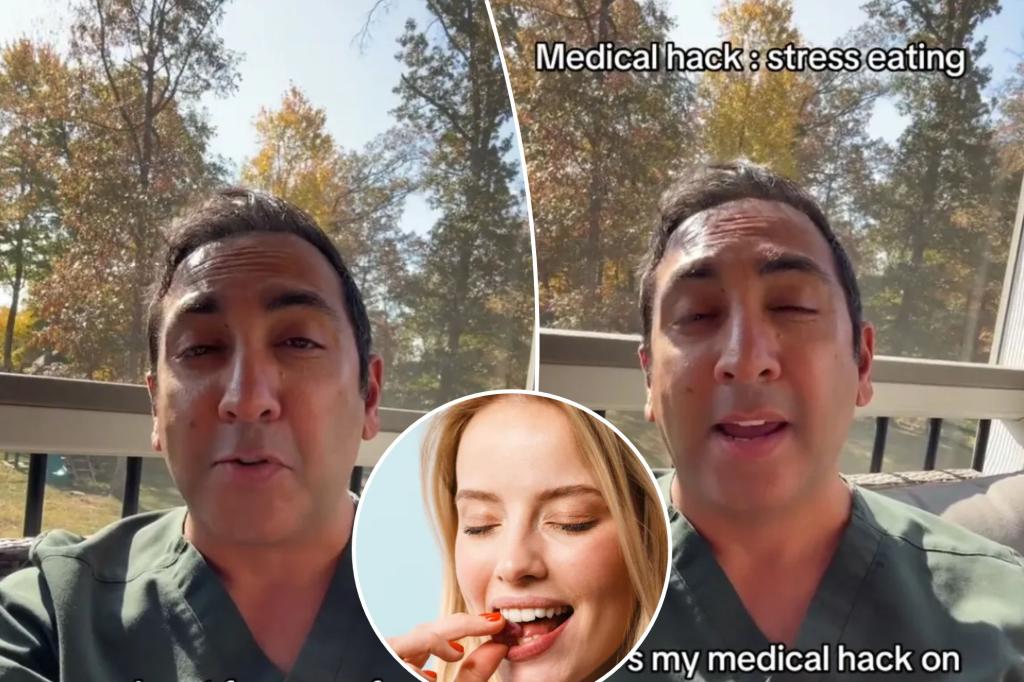Dr. Jason Singh, a primary care physician from Virginia, suggests managing stress eating by letting frozen grapes melt in your mouth. He explains that the cold temperature of the grapes activates TRPM8 receptors in the mouth, leading to the release of dopamine, which provides pleasure similar to what people seek during stress. These receptors are typically activated by temperatures below core body temperature, with researchers finding they become most active at around 50 degrees Fahrenheit.
Activated TRPM8 receptors can suppress the release of CGRP, a neuropeptide that depletes dopamine in the brain, and increase levels of interleukin-10, an anti-inflammatory protein that responds to stress. Additionally, the cooling sensation of the grapes can stimulate the parasympathetic nervous system, resulting in a lower heart rate, breathing rate, blood pressure, and cortisol levels, as well as promoting digestion. Cold situations have been shown to decrease cortisol levels in the body, such as immersion in chilly water. Chewing the grapes also leads to saliva production, making the brain believe that something substantial has been eaten and causing a feeling of fullness.
Grapes are beneficial for weight loss as they are low in calories, with only 62 calories in a cup of grapes. They also contain a significant amount of water and fiber, along with vitamins C and K, as well as the heart-healthy antioxidant resveratrol. These components contribute to the overall health benefits of grapes. Including grapes in the diet can be a useful strategy for those looking to manage their weight and improve their health. The combination of low calories, high water and fiber content, and essential vitamins and antioxidants make grapes a nutritious addition to a well-rounded diet plan.
The idea of using frozen grapes as a stress-relief tool offers a unique and practical approach to managing stress eating. By incorporating the cold temperature aspect and the activation of TRPM8 receptors in the mouth, individuals can potentially achieve a sense of pleasure and satisfaction that helps mitigate stress-related cravings. Furthermore, the physiological effects of grape consumption, such as the suppression of cortisol and the promotion of digestive processes, can contribute to an overall sense of well-being and relaxation during stressful situations. This method presents a natural and healthy way to address stress-induced eating behaviors and promote a balanced approach to emotional eating.
The scientific explanation behind the effectiveness of frozen grapes in managing stress eating sheds light on the intricate relationship between food, physiology, and emotional well-being. Understanding how the cold temperature and TRPM8 receptors interact with the brain’s chemistry to produce feelings of pleasure and reduce stress-induced responses offers valuable insights into the potential benefits of incorporating specific foods into stress management strategies. By leveraging the unique properties of grapes and the physiological responses they elicit, individuals can develop healthier coping mechanisms for dealing with stress and emotional eating. Dr. Singh’s recommendation highlights the importance of mindful eating practices and the potential impact of food choices on mental and emotional health.
In summary, frozen grapes offer a refreshing and nutritious solution to stress eating, combining the physiological benefits of temperature activation, dopamine release, and stress reduction mechanisms. By incorporating grapes into one’s diet as a snack or stress-relief tool, individuals can access a natural and effective way to manage cravings and emotional eating patterns. The nutritional content of grapes, including their low calorie count, high water and fiber content, and essential vitamins and antioxidants, further enhances their value as a health-promoting food choice. With the guidance of professionals like Dr. Jason Singh, individuals can explore innovative and science-based approaches to address stress-related eating behaviors and improve overall physical and emotional well-being.


